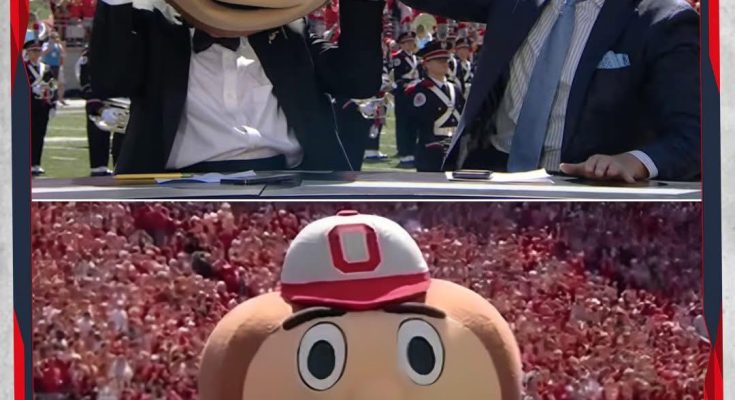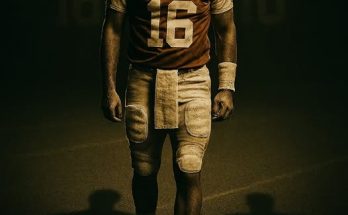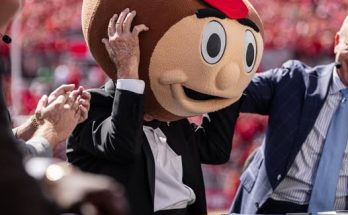“Farewell Tradition: Lee Corso’s Final Headgear Pick Belongs to the Ohio State Buckeyes” is more than just a headline about a beloved sports personality making one last symbolic choice on ESPN’s College GameDay. It represents the closing chapter of one of the most iconic traditions in college football history. For over three decades, Lee Corso has captivated audiences not just with his football knowledge, but with his personality, charisma, and most famously, his headgear picks. Week after week, year after year, fans tuned in not only to hear analysis of upcoming matchups but to wait for that one unforgettable moment when Corso would pull out the oversized mascot head and place it on his own. The anticipation, the laughter, the occasional surprises, and the enduring charm made it something bigger than a sports gimmick. It became an institution. Now, with his last-ever headgear pick, Corso leaves the stage with a flourish by selecting the Ohio State Buckeyes, a program steeped in tradition and one that perfectly encapsulates the essence of college football.
To understand the weight of this moment, one must first appreciate Lee Corso’s legacy and the importance of the headgear pick itself. Corso joined College GameDay in 1987, and at the time, the show was far from the cultural phenomenon it would later become. Initially, it was a straightforward football analysis program, designed for the die-hard fan. What transformed it into appointment viewing on Saturday mornings was its ability to blend serious football discussion with entertainment value. Corso was instrumental in this transformation. His deep football background, having served as both a player and a coach, gave him credibility, but his personality gave the show its heartbeat. He was never afraid to be bold, to be playful, or to inject fun into the seriousness of the sport. In 1996, he began a tradition that would forever define him: the headgear pick.
The idea was simple but brilliant. At the end of the show, just before kickoff, Corso would make his pick for the featured matchup. Instead of simply saying who he thought would win, he would don the mascot head of the team he was predicting. The first time he did it, he surprised viewers by putting on Brutus the Buckeye’s oversized head to predict an Ohio State victory over Penn State. That single act set off a tradition that endured for nearly three decades. It became a moment of suspense and joy for fans, and it turned Corso into something more than an analyst—he became part of the pageantry of college football itself.
That first choice, selecting Ohio State, made it all the more fitting that his final headgear pick also belonged to the Buckeyes. It feels like a full-circle moment, the perfect bookend to a tradition that defined an era. Corso’s connection to Ohio State was never about being a fan of the program but rather about recognizing its place within the tapestry of college football. The Buckeyes have long been one of the sport’s most powerful and storied programs, with national championships, Heisman winners, and countless iconic moments. By choosing them once more as his final headgear pick, Corso is not just predicting a game but paying homage to the role Ohio State played in his journey and the journey of College GameDay.
The impact of Corso’s headgear picks cannot be overstated. For many college football fans, especially younger generations, Saturday mornings started not with kickoff but with the GameDay broadcast and the buildup to Corso’s moment. Whether fans agreed with his choices or not, whether his predictions were right or wrong, the headgear pick was always entertaining. It was theater, tradition, and football culture rolled into one. In an era when television has had to fight for attention in the digital age, this segment stood as proof that certain rituals still matter, that shared experiences still exist, and that sports are not just about competition but about community.
Corso’s final pick carries an emotional weight that reflects not only his career but also the way college football is evolving. The sport today is undergoing massive change with conference realignment, playoff expansions, NIL deals, and shifting rivalries. Amid all these changes, Corso’s presence on GameDay has been one of the constants. Fans could count on him to be there, larger than life, ready to make his pick with a grin and a flourish. His departure, marked by that final donning of Brutus the Buckeye’s head, feels like the end of an era. It is a reminder that traditions are precious, and when they end, they leave a void that cannot easily be filled.
Educationally, this moment also teaches us about the importance of rituals in sports and in life. Rituals, whether they be as grand as singing the national anthem before games or as quirky as one man putting on a mascot head, provide a sense of continuity and belonging. They connect fans across regions, generations, and backgrounds. They remind us that sports are not just about the scoreboard but about the stories, the memories, and the shared emotions. Corso’s headgear picks embodied that lesson. They were silly, yes, but they were also profound in the way they brought people together. From packed college campuses where GameDay set up shop to living rooms across the country, millions shared in the laughter and excitement of that one moment.
The choice of Ohio State also holds symbolic significance. The Buckeyes represent one of the pillars of college football history. They have a massive fan base, a storied rivalry with Michigan, and a tradition that stretches back over a century. For Corso to end his career with Brutus once again is to highlight the importance of programs that serve as anchors in the sport. It underscores that while college football is always changing, certain institutions remain central to its identity. The Buckeyes, like Corso himself, are part of the DNA of the game.
From an educational standpoint, Corso’s career also demonstrates the way sports media can shape culture. Analysts are not just reporters of events; they are storytellers and entertainers. Corso showed that by embracing personality, humor, and showmanship, sports coverage can transcend statistics and playbooks. It can become cultural theater. His approach paved the way for countless others in sports media who realized that connecting with fans requires more than dry analysis—it requires heart, character, and a willingness to be memorable. In classrooms that study sports communication and media, Corso’s headgear picks could easily be used as a case study in how traditions are created, how audiences are engaged, and how sports coverage becomes part of the fan experience.
The farewell moment is also instructive in another way: it highlights the role of individuals in shaping institutions. College GameDay is now a juggernaut, a traveling roadshow that draws thousands of fans at every stop, but its identity is tied inseparably to Lee Corso. He was there from the early days, before the show grew into what it is today, and he was the one who created its most iconic tradition. As much as fans love GameDay as a whole, it is impossible to imagine it without Corso. His departure raises questions about the future of the show and how it will adapt. But more importantly, it reminds us that institutions, no matter how large, are often defined by the unique contributions of individuals who bring something special.
As the camera captured Corso putting on Brutus one last time, there was more than applause; there was reverence. Fans understood that they were witnessing history, not just another pick. They were saying goodbye to a man who had become part of their Saturdays, part of their football seasons, part of their lives. The standing ovations, the tears in the crowd, and the tributes that poured in afterward all reflected how deeply Corso had touched people. In that sense, his final pick was not about Ohio State versus another team—it was about Corso versus time, and the acknowledgment that while time always wins, traditions endure.
One of the key lessons from this moment is the value of ending with grace. Corso could have ended his career in any number of ways, but by returning to his first headgear pick, he chose a poetic close. It shows the importance of endings that honor beginnings, of full-circle moments that bring closure. It is a lesson applicable far beyond sports: in careers, in projects, in personal journeys, the way we end often matters just as much as the way we start. By aligning his last act with his first, Corso provided fans with not just nostalgia but meaning.
The future of College GameDay without Lee Corso will undoubtedly be different, but his influence will never fade. His headgear picks will live on in highlight reels, in YouTube clips, and in the memories of millions. More importantly, the spirit of fun, tradition, and connection that he embodied will continue to inspire how the show is produced and how fans engage with it. Analysts may come and go, but the lessons Corso taught—about joy, about showmanship, about making sports personal—will remain.
In the grand scheme of sports history, some might argue that a man putting on a mascot head is a small thing. But in reality, it is the small things that often define traditions, that capture imaginations, and that leave lasting legacies. Corso’s headgear picks were never about statistical accuracy or predictive genius. They were about joy, theater, and the simple act of making people smile. That is why they mattered, and that is why his final pick mattered so deeply.
“Farewell Tradition: Lee Corso’s Final Headgear Pick Belongs to the Ohio State Buckeyes” is not just a story about a game, a prediction, or even a television show. It is a story about legacy, about the power of ritual, and about the way one man became a symbol of college football’s unique spirit. As Corso lifted Brutus onto his head one last time, he reminded everyone that sports are not just about who wins or loses—they are about the people who make them unforgettable. In choosing Ohio State, he brought his journey full circle, closing a chapter that will never be replicated but will forever be remembered. And in that moment, Lee Corso didn’t just make a pick; he made history.



